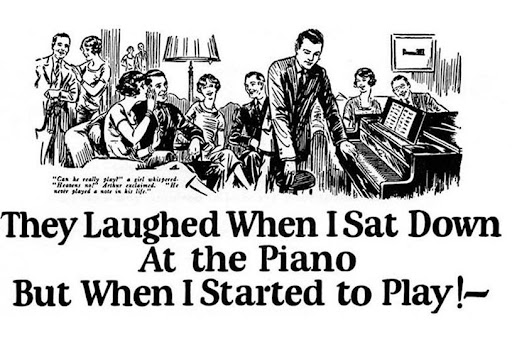Writing to Sell
Copywriting: The Art of Writing to Sell
The Fast Track to Success
As we’ve already seen, you can make good money doing all kinds of writing work. But what if you want to do better than ‘good.’ How do you get to ‘great’ in terms of writing income?
For sure, you could try your hand at writing a bestselling novel or a movie screenplay. Many people have made a lot of money doing just that. But let’s be honest, that’s a ‘lottery ticket’ type opportunity. You might get lucky…but you probably won’t.
Fortunately, you have another option. There’s another class of writers who make great money while staying very much under the radar. They’ve discovered that there’s a realistic way to make top dollar from your writing skills…and that’s to master the craft of copywriting.
So what is copywriting exactly? Here’s a definition from the American Writers & Artists Institute:
The ultimate goal of copywriting is usually to encourage people to buy a product or service. And that’s why this skill is so valuable. Every business needs to make sales, but few business owners have the skills to make this happen.
Whether they sell online or in the real world, businesses need some kind of ‘sales funnel.’ That’s simply a process for introducing people to their products, then persuading them to buy. Copywriters help by creating persuasive writing that secures the sale.
As a copywriter, you may be asked to write the text (copy) for creatives such as:
Advertisements
Most sales funnels start with some kind of advertisement, often on online platforms such as:
You might wonder why people would pay you good money to write their resumes. Surely it can’t be that hard…why don’t they just do it themselves? The fact is, there are many reasons why people choose to outsource this task. They know that professional resume writers:
Copywriters play a critical role here by attracting the right people's attention, engaging their interest, and persuading them to click to find out more.
You might also be asked to write adverts to be published in newspapers, magazines, or other real-world publications. The media may be different, but the same persuasion skills are required.
Landing pages
Once someone has clicked on an ad, they will usually be taken to a landing page. This typically provides more information and presents a free offer, persuading the prospect to join a mailing list.
Landing pages are usually relatively short, which means the copywriter needs to get the right message across quickly and effectively.
Sales pages
Ultimately, prospects are likely to be presented with a sales page. This is where copywriters earn their money, as they have to persuade people to part with their hard cash.
Sales pages tend to be rather long, often including thousands of words of copy. But, because of this, they pay well, too. Better still, writing sales pages can be a lot of fun. Here you get the chance to use your storytelling skills as you explain how the product can change the prospect’s life.
Sales videos
Sometimes, business owners choose to use a Video Sales Letter (VSL) instead of a text sales page. This can be very effective, as people love watching videos.
Once you’ve mastered the skill of writing text sales pages, you will find it easy to transition into writing sales videos. Of course, there are some differences, but the core skills are very much the same.
Webinars
Another way to present offers is to use webinars or presentations. These are very popular with more expensive ‘high-ticket’ promotions. For example, a webinar may be used to sell a $10,000 coaching program.
The copywriter plays a key role here by writing a script for the host to narrate, as well as suggesting ideas for slides and other visuals.
These are the most common types of work assigned to copywriters, but there are many other possibilities, too. The work is always interesting…and you never know what kind of project may come up next!
How Much Can You Make?
How to Get Rich from Writing
If you’re looking to make a six-figure—or even seven-figure income—then becoming a copywriter is undoubtedly your best option. Many people have used copywriting to turn their lives around, going from struggling to thriving double-quick.
You could level up like copywriter Justin Goff. Entrepreneur Magazine reports that Justin became a multi-millionaire in a few years. He’s in demand because his writing helps companies scale their businesses to new heights. Yet not so many years ago, his life was challenging, and making a living in Austin was hard. Justin says:
"For me, it was brutal. I was living in a $250 a month apartment, sleeping on a blow-up mattress in the middle of the living room. It was me and my two dogs and nothing else."
Then he discovered the world of copywriting and pivoted. As a result, his income soared over the next few years. Soon he was making a six-figure income, and things kept getting better.
Today, Justin is well into the 7-figure income bracket. In his email newsletter, he says:
"I personally had a jump in income, starting in 2015 when my income went from $220k to $700k to over $2.2 million a year.”
That might seem like an astonishing number, and let’s be honest, you won’t make that kind of money right out of the gate. But if you persevere and learn the skills you need, you certainly have the opportunity to reach the big league.
Even as a relative newbie in this world, you can make good money. Here’s the kind of income you can expect to make as a sales-focused copywriter:
Once you reach the advanced level, you will find that even more exciting opportunities open up. When you are in demand, you can negotiate joint ventures and profit-sharing arrangements. This is what top copywriters do to take their income to the moon.
So get good at this, and there’s no telling how far you could go!
How to Write Great Copy
Methods that Make Millions
Now you know that copywriting has unlimited potential, no doubt you are excited to get started. First of all, though, you need to acquire some basic copywriting skills. Here are some insights that will get you started on the road to success.
Define your Goal
Every piece of copy needs to have a clear goal. For instance, do you want to sell one particular product, a product bundle, or a more expensive version of the product? You can use your sales copy to push your audience toward the desired action.
You must always know precisely what your goal is, then focus relentlessly on achieving that goal. It’s a big mistake to try to achieve more than one goal at a time. If you do, you will most likely end up achieving nothing.
Identify your Target Audience
You need to know exactly what your target audience expects from your product or service. If you cannot speak to those desires, you’ll wind up with copy that doesn’t sell.
Picture the ideal customer in your mind when writing sales copy. Think about the following:
Once you’ve identified the ideal customers, speak to them in language that they will understand. Use vocabulary and expressions that make sense to them, helping them feel they are in the right place.
Use Compelling Words
Boring copy will cause readers to click away. So think about ways to captivate your audience’s imagination through evocative prose.
Consider these two pieces of sales copy designed to convince a consumer to buy a new AC unit:
1. Are you ready to replace your old AC unit? We have a wide range of products to fit your needs, and we offer free in-home consultations with our licensed technicians. Select your new AC unit today and start reaping the benefits of chilled air.
2. It’s late afternoon on the hottest day of the summer, and suddenly there’s no air coming through your vents. All the fans in the world won’t keep you from sweating in your home, so you’re scrambling to get someone to fix or replace your AC. Don’t let this happen to you!
The second one paints a picture. It hits a pain point. The target consumer will immediately connect to the panic they would feel after an AC disaster.
Make it Readable
Too many marketers write sales copy that’s hard to read. For example, they include technical specifications that will never inspire consumers to buy. The same goes for dense blocks of text. You need to aim for better readability, which comes down to several factors:
Selling an expensive product may require a lot of sales copy, making readability a key issue. So ensure that your copy is easy to read from the beginning right through to the end.
Tell a Story
Using a story to focus your sales copy can yield excellent results. People love stories, and they help keep your audience engaged and interested.
You can use testimonials and case studies to tell stories. Alternatively, tell the brand story and what led to creating the product or service in the first place.
Many copywriters have discovered they can increase sales simply by adding a good story to hook readers in. It’s a technique as old as the hills, but it still works like gangbusters.
Overcome Objections
Prospects will always have concerns and questions that make them hesitate to buy. As a copywriter, one of your key jobs is to counter these objections and show they are nothing to worry about.
Make a list of all the issues that may prevent people from purchasing. Then write answers to each of these objections in your copy.
Highlight the Benefits
Too often, marketers get mired in features. For instance, the features of an AC unit could include:
However, what’s really important to consumers is the benefits these features offer. For example, a variable-speed unit reduces running costs, saving the consumer money.
When you’re writing copy for sales, interpret the features of your product or service as benefits. Talk about the outcome, not the technical feature that creates it. If you show how the product makes people’s lives better, you will increase sales dramatically.
Create a Call to Action
At the end of every piece of sales copy, include a clear ‘call to action’ that tells people what to do next. Don’t let people work this out for themselves. To maximize sales, you must tell people precisely how to proceed.
Your call to action might be:
A powerful call to action can help you achieve much better results in every step of the sales funnel.
Mastering the art of copywriting takes time. But if you learn these basics, you will already be ahead of most people in the field. So take these principles to heart and use them to launch a new future in the world of copywriting.
Copywriting Tips & Tricks
Proven Profit-Making Principles
If you want to make top dollar from copywriting, you need to be the best in the business. Here are some insider tips, tricks, and tactics that will give you the winning edge—and set you on the road to potential riches.
Get a Clear Brief
Starting a copywriting project without a clear brief is like setting out on a road trip without a map. If you don’t know where you’re going, you will never get there.
So make sure your client tells you everything you need to know about the project, including:
Do Your Research
Once you have a brief, you need to conduct research. Legendary copywriter Gary Bencivenga, said:
“The best copywriters are the most tenacious researchers. Like miners, they dig, drill, dynamite, and chip until they have carloads of valuable ore. Copywriter John Caples advised me once to gather seven times more interesting information than I could possibly use... Research is the infallible cure for writer's block.”
The more information you have, the more possibilities you can play with.
Define the Unique Selling Proposition
Every successful product has something that makes it stand out from the crowd. As a copywriter, you must identify and refine this unique selling proposition (USP).
This USP needs to be a compelling proposition that makes potential buyers sit up and take notice. If the USP isn't clear yet, work with your client to pinpoint the heart of the offer.
Refine your Headline
On average, five times as many people read the headline as the body copy. Write the copy first, then pull out the strongest phrases to use as headlines and subheadings. This ensures your headlines match your copy.
Opt for straightforward, simple headlines over tricky or clever ones, and remember the 4 U’s:
Paint a vivid picture or stimulate an intense emotion. These grab attention and add interest, instantly conveying the most important benefit.
Copywriting Hall-of-Famer John Caples divided successful headlines into three classes. In his experience, the third-best headlines used curiosity, the second-best used news, and the best of all used the reader’s self-interest.
He suggested that writers “try to get self-interest into every headline” and “avoid headlines that merely provoke curiosity... curiosity by itself is seldom enough.”
Give Your Audience What They Want
Copywriter Gary Halbert told a story about the best advantages a restaurant could have. It wasn’t great food, low prices, or a good location. The key to any restaurant’s success is a starving crowd. You start with a group of people who have demonstrated their hunger, and then you satisfy that need.
You can’t create desire; you can only stoke and channel it. Great copy gives your audience exactly what they already want.
Break the Rules
This copywriting tip might seem counter-intuitive, but the best writers know when and how to break the rules of proper grammar, syntax, and mechanics. As David Garfinkel said, “I've advised many clients who feel compelled to use ‘proper English’ in their sales letters… to ‘fire your English teacher!’"
Speaking directly to your prospect in language they’ll easily understand is always more important than writing things by the book.
Keep a Swipe File
Keep a swipe file of ads and other copy or content that has performed well. That way, whenever you’re stuck on a tough headline or don’t know what to try next, you can glance through your collection and jumpstart your creativity.
Think Outside the Box
David Ogilvy said, “Talent, I believe, is most likely to be found among nonconformists, dissenters, and rebels.” Don’t be afraid to try something different and new because it just might work.
Unhook your rational thought process and allow your subconscious to connect ideas. That’s when you’ll come up with the best content and copywriting ideas.
Ask Questions that Get Readers to Say “Yes”
A classic persuasion technique used by Socrates and used car salesmen, this theory states that the more often you can get prospects to say “yes,” the more likely they are to say “yes” again. A-list copywriter Parris Lampropoulos uses this technique a different way:
“In sales copy, I’ll throw in a question here and there, but more often, I’ll phrase it as a statement. You know, one of those statements that get prospects nodding their heads.”
If they’re saying “yes” and nodding their heads, you’ve hooked them.
Appeal to Emotion
Early in his career, Lampropoulos saw a particular copywriting gig as his chance to make it to the big league, so he pulled out all the stops. In addition to packing it with proof elements, testimonials, and price justifications, he also “worked every possible emotion the reader might have.” It was one of his most successful direct-mail packages, and it made money for four years.
The trick to incorporating emotions in your copy is to ask yourself: “what is my prospect’s deepest desire right now?” There are lots of emotions you can appeal to, but the key driving emotions are:
Find a Unique Angle or Hook
When asked about his process for writing stock stories and promotions for financial newsletters, Parris Lampropoulos said:
“First, I go to Fortune, Forbes, and BusinessWeek and read every article I can find on the company being recommended. Then I do something unusual: I sit down and start writing ideas for those articles. By doing that, I find all kinds of unexploited sales angles. Those angles lead me to the "hook" for the story. And once I’ve got the hook, the story almost writes itself.”
Use Imagery
Imagery helps readers instantly understand a situation or benefit (plus, it makes your copy more interesting to read). Copywriter David Garfinkel says one of his favorite headlines/slogans is this one for a plumbing service:
Call Roto-Rooter—that's the name. And away go troubles, down the drain!
Describing it, he says: “Wow, is that perfection in a couple of lines or what? You get a call to action, company identification, and a visual description of the benefit.”
Build Credibility
Another very successful copywriter, Steve Slaunwhite, said:
“In my experience, the number one key to persuasion is this: communicate trust. If you do this well, you at least have a chance at engaging and persuading the reader. If you don’t do this well, however, no amount of fancy copywriting techniques will save you.”
You can build credibility and trust by mentioning credentials like:
Build these tips and techniques into your copywriting to get a head start over other writers. You’ll find that your writing truly stands out—and business owners will soon be beating a path to your door.
Training Modules
Copyright 2024 - Paid Online Writing Jobs - All Rights Reserved
Copyright 2023 - Paid Online Writing Jobs - All Rights Reserved

















 ?
?

 !
!